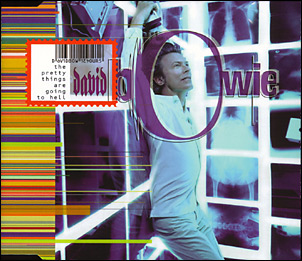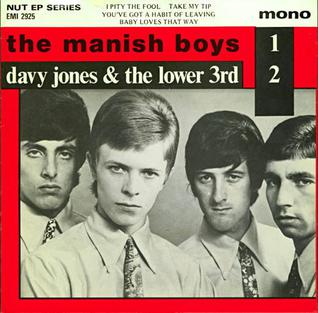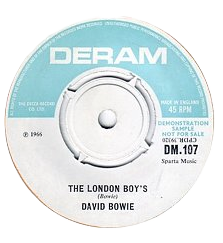Related Research Articles

Earthling is the 21st studio album by the English musician David Bowie, released on 3 February 1997 through RCA Records in the United Kingdom, Virgin Records in the United States, and Arista Records/BMG in other territories. Mostly self-produced by Bowie, it was primarily recorded from August to October 1996 at New York City's Looking Glass Studios. Bowie composed the tracks with Reeves Gabrels and Mark Plati, who are credited as co-producers, with Mike Garson, Gail Ann Dorsey and Zack Alford providing overdubs later.

David Bowie is the debut studio album by the English musician David Bowie, originally released in the United Kingdom on 1 June 1967 through Decca subsidiary Deram Records. Produced by Mike Vernon and recorded from November 1966 to March 1967 in London, the album followed a string of singles Bowie released for Pye Records that failed to chart. Vernon hired numerous studio musicians for the album's sessions; Bowie and his former Buzz bandmate Derek Fearnley composed music charts themselves using a musical guidebook.

David Bowie is the second studio album by the English musician David Bowie, originally released in the United Kingdom on 14 November 1969 through Mercury affiliate Philips Records. Financed by Mercury on the strength of "Space Oddity", the album was recorded from June to October 1969 at Trident Studios in London. Gus Dudgeon produced "Space Oddity", while Tony Visconti produced the rest of the album. It featured an array of collaborators, including Herbie Flowers, Rick Wakeman, Terry Cox and the band Junior's Eyes.

"I Dig Everything" is a single by the English singer-songwriter David Bowie. It was his final single for Pye Records, released on 19 August 1966. The track was originally demoed with Bowie's then-band, the Buzz, but producer Tony Hatch was unhappy with their efforts and replaced them with session players. It is a pop song that musically and lyrically reflected the mid-1960s Swinging London era. The single was another commercial failure and resulted in the label dropping him. The original recording was included on the Early On (1964–1966) compilation in 1991.

"Rubber Band" is a song by the English singer-songwriter David Bowie. It was recorded in October 1966 following Bowie's dismissal from Pye Records and helped secure him a record contract with Decca-subsidiary Deram Records, who released it as a single in the United Kingdom on 2 December of the same year. A departure from the mod-style sound of his previous releases, "Rubber Band" displays a style informed by vaudeville and British music hall – influenced particularly by British actor Anthony Newley. The lyrics tell the story of a man who goes off to war and, upon his return, finds his lover fell for a brass band conductor.
"Love You till Tuesday" is a song written and performed by David Bowie. The first version of the song, recorded in February 1967, was included on Bowie's debut album. A second version, released as a single, was recorded on 3 June 1967 and released on 14 July 1967. The single garnered good notices from the music press but, like his earlier singles, failed to break into the British charts. It was his final new release for Deram Records.

"John, I'm Only Dancing" is a song by the English musician David Bowie, originally released as a non-album single on 1 September 1972. A glam rock and R&B number, the lyrics describe a situation in which the narrator informs his lover not to worry about the girl he is with because he is "only dancing" with her. Although ambiguous, many interpreted it as concerning a gay relationship. Recorded in London in June 1972, it was boosted by a low-budget promotional video directed by Mick Rock. It reached number 12 in the UK; RCA refused to release it in America due to its suggestive lyrical content.
"Oh! You Pretty Things" is a song by the English singer-songwriter David Bowie from his 1971 album Hunky Dory. It was the first song he wrote for the album. Bowie recorded the song as a demo before giving it to singer Peter Noone, lead singer of Herman's Hermits, who decided to release it as his debut solo single. Featuring Bowie on piano, Noone's recording was produced by Mickie Most and featured structural and lyrical differences from Bowie's later version. Released by RAK Records in April 1971 under the title "Oh You Pretty Thing", the single peaked at number 12 in the UK, becoming Bowie's biggest success as a songwriter since his own single "Space Oddity" two years earlier.

"Stay" is a song by the English musician David Bowie, released on his 1976 album Station to Station. The song was recorded in late 1975 at Cherokee Studios in Los Angeles. Co-produced by Bowie and Harry Maslin, the recording featured guitarists Carlos Alomar and Earl Slick, bassist George Murray, drummer Dennis Davis, pianist Roy Bittan and Warren Peace on percussion. The track features prominent dual guitar work from Slick and Alomar, who mostly composed it in the studio. Based on the chord structure of "John, I'm Only Dancing (Again)", a funk reworking of "John, I'm Only Dancing" (1972), "Stay" emulates funk rock, soul and hard rock. The song's lyrics are abstract and relate to love.

"Survive" is a song by the English musician David Bowie from his 1999 album Hours. It was later released in remixed form as the album's third single on 17 January 2000, reaching number 28 in the UK. Written by Bowie and Reeves Gabrels, it is a reflective number detailing the end of a relationship. Musically, it recalls the sound of Bowie's folk rock music of the late 1960s, and 1971's Hunky Dory. Its music video echoes the reflective quality of the recording, portraying Bowie levitating at a kitchen table with an egg. Praised as a highlight of Hours, Bowie performed "Survive" frequently through 1999 and 2000.

"The Pretty Things Are Going to Hell" is a song by the English musician David Bowie from his 1999 album Hours. Written by Bowie and Reeves Gabrels, its title references past songs such as "Oh! You Pretty Things" and the Stooges' Raw Power track "Your Pretty Face Is Going to Hell". On Hours, the song is a rockier number that contains elements of 1970s glam rock. The lyrics offer views on disillusionment and aging. The song was first released in a different mix in the film Stigmata before being released as the first single from the album in Australia and Japan, replacing "Thursday's Child". An unreleased music video was filmed that depicted Bowie encountering several of his past personas. It was performed live in 1999 and 2000.
"Shadow Man" is a song written by the English singer-songwriter David Bowie. It was first recorded on 15 November 1971 at Trident Studios in London during the sessions for The Rise and Fall of Ziggy Stardust and the Spiders from Mars (1972) and left unreleased. A folk ballad, the lyrics discuss topics of self-identity and doubling, and the impact one's present self has on their future lives, themes some linked to the Shadow concepts of Carl Jung.

"You've Got a Habit of Leaving" is a song by the English singer-songwriter David Bowie, recorded and released as a single on 20 August 1965 through Parlophone. Released under the name Davy Jones, it featured his band at the time, the Lower Third, whose contributions were uncredited. Produced by Shel Talmy and recorded in early July 1965, the single marked a departure from the Americanised R&B of his two earlier singles into Who-style mod music. The original recording later appeared on the compilation albums Early On (1964–1966) (1991) and Nothing Has Changed (2014).
"Baby Loves That Way" is a song written by David Bowie in 1965 and released as the B-side of single "You've Got a Habit of Leaving" under the name Davy Jones with his band at the time, the Lower Third, who were uncredited. Bowie remade the song during the sessions for his Toy album in 2000, which was officially released in 2021.

"Can't Help Thinking About Me" is a song written by the English musician David Bowie and recorded with his band the Lower Third. Released as a single by Pye Records on 14 January 1966, it was the first one issued under the "David Bowie" name after previously performing as Davy Jones or Davie Jones. The recording was produced by Tony Hatch, who also contributed piano. The session took place on 10 December 1965 at Marble Arch Studios in London. A rewrite of Bowie's "The London Boys", the song concerns a boy found guilty of an act that decides to leave town to start anew. It is noted by biographers as showcasing Bowie's growth as a songwriter, displaying themes he would utilise in his later work. Musically, the song explores the contemporary mod sound of the Who and the Kinks.

"The London Boys" is a song by the English musician David Bowie. It was first released as the B-side of the single "Rubber Band" in the United Kingdom on 2 December 1966. It was originally written and demoed in 1965 with the Lower Third for potential release as the artist's debut single for Pye Records but it was rejected. After a year of rewrites, he recorded a new version with a new band, the Buzz, which helped secure him a record contract with Decca-subsidiary Deram Records. Unlike the A-side, "The London Boys" retains the Mod feel of Bowie's previous singles. The dark lyrics concern a 17-year-old who leaves home for London and becomes embroiled in the Mod scene, turning to pills to fit in. Like his previous singles, it failed to chart. Decca later issued it as an A-side in 1975..

Toy is a studio album by the English musician David Bowie, posthumously released in November 2021. It was recorded from July to October 2000 in New York City and featured re-recordings of songs Bowie recorded between 1964 and 1971, along with a couple of new tracks. The project was co-produced by Bowie and Mark Plati and featured musicians from Bowie's then-touring band—Plati, Earl Slick, Gail Ann Dorsey, Mike Garson and Sterling Campbell—with overdubs from Lisa Germano, Gerry Leonard and Cuong Vu.
"Let Me Sleep Beside You" is a song written and recorded by the English singer-songwriter David Bowie. It was recorded on 1 September 1967 at Advision Studios in London and marked the beginning of Bowie's working relationship with producer Tony Visconti, which would last for the rest of Bowie's career. A departure from the pop and music hall-influenced material of Bowie's 1967 self-titled debut album and other singles for Deram Records, the song displays a more rock-oriented sound with a cello arrangement from Visconti. The impressionist lyrics also depart from Bowie's prior works, describing love using the act of sleeping together rather than through emotional attachment. The song was rejected by Deram for release as a single, purportedly due to the risqué title. It remained unreleased until 1970's The World of David Bowie compilation.
"Karma Man" is a song written and recorded by the English singer-songwriter David Bowie. It was recorded on 1 September 1967 at Advision Studios in London and marked the beginning of Bowie's working relationship with producer Tony Visconti, which would last for the rest of the artist's career. The song expresses Bowie's growing interest in Tibetan Buddhism, concerning a character who is put on display as a "freak" in a carnival tent. The music reflects the Buddhist themes and was likened to the works of the Beatles. Initially proposed as a B-side, it remained unreleased until The World of David Bowie compilation in March 1970. Bowie performed the song during two of his BBC radio sessions, one of which was released on the 2000 compilation Bowie at the Beeb.
References
- ↑ Cann 2010, p. 62.
- 1 2 3 4 5 6 7 8 9 O'Leary 2015, chap. 2.
- 1 2 3 4 5 6 7 8 9 10 11 12 13 Pegg 2016, pp. 243–244.
- 1 2 3 4 5 6 Doggett 2012, pp. 427–428.
- 1 2 3 4 Unterberger, Richie. "'Silly Boy Blue' – David Bowie". AllMusic. Archived from the original on 11 July 2021. Retrieved 2 February 2022.
- ↑ Cann 2010, p. 105.
- ↑ Trynka 2011, p. 99.
- ↑ Cann 2010, p. 104.
- ↑ Pegg 2016, pp. 328–333.
- ↑ Cann 2010, pp. 93–94.
- ↑ "David Bowie – The 100 Greatest Songs". Mojo (255): 59. February 2015.
- ↑ Cann 2010, p. 101.
- ↑ Pegg 2016, p. 655.
- ↑ Cann 2010, pp. 120–121, 130.
- ↑ Pegg 2016, pp. 629–630.
- ↑ Buckley 2005, p. 46.
- ↑ Pegg 2016, p. 146.
- ↑ O'Leary 2019, chap. 10.
- ↑ Wolk, Douglas (1 June 2016). "Remembering the Debut Album David Bowie Tried to Forget". Rolling Stone . Archived from the original on 28 February 2021. Retrieved 21 January 2022.
- 1 2 3 Pegg 2016, pp. 438–440.
- 1 2 O'Leary 2019, chap. 11.
- ↑ Buckley 2005, pp. 488–489.
- ↑ Greene, Andy (29 September 2021). "David Bowie's Lost Album 'Toy' Emerges From the Vaults". Rolling Stone. Archived from the original on 29 September 2021. Retrieved 26 December 2021.
- ↑ Trynka 2011, p. 458.
- ↑ Michaels, Sean (23 March 2011). "David Bowie's unreleased album Toy leaks online". The Guardian . Archived from the original on 2 January 2018. Retrieved 5 April 2011.
- ↑ Perpetua, Matthew (22 March 2011). "Unreleased David Bowie LP 'Toy' Leaks Online". Rolling Stone. Archived from the original on 23 January 2013. Retrieved 5 April 2011.
- 1 2 Snapes, Laura (29 September 2021). "David Bowie: unreleased 2001 album Toy to get official issue". The Guardian. Archived from the original on 29 September 2021. Retrieved 29 September 2021.
- ↑ Kaufman, Gil (29 September 2021). "Lost 2001 David Bowie Album 'Toy' Set For Release". Billboard . Archived from the original on 13 December 2021. Retrieved 26 December 2021.
- ↑ "Karma Man/Silly Boy Blue streaming single". David Bowie Official Website. 14 October 2021. Archived from the original on 13 December 2021. Retrieved 4 January 2022.
- ↑ Jones, Damian (15 October 2021). "Listen to two previously unreleased versions of David Bowie's 'Karma Man' and 'Silly Boy Blue'". NME . Archived from the original on 16 October 2021. Retrieved 1 February 2022.
- ↑ Whitaker, Marisa (29 September 2021). "Previously Unreleased David Bowie Album Toy to Arrive Next Year". Spin . Archived from the original on 14 October 2021. Retrieved 26 December 2021.
- ↑ "David Bowie: 'Lost' album Toy set for birthday release". BBC News. 29 September 2021. Archived from the original on 29 September 2021. Retrieved 26 December 2021.
- ↑ "Brilliant Adventure and TOY press release". David Bowie Official Website. 29 September 2021. Archived from the original on 29 September 2021. Retrieved 29 September 2021.
- ↑ Petridis, Alexis (25 November 2021). "David Bowie: Toy review – 1960s gems polished on lost album". The Guardian. Archived from the original on 24 December 2021. Retrieved 25 December 2021.
- ↑ Ehrlich, Brenna (23 November 2021). "David Bowie 'Toy' Review". Rolling Stone. Archived from the original on 22 December 2021. Retrieved 26 December 2021.
Sources
- Buckley, David (2005) [1999]. Strange Fascination – David Bowie: The Definitive Story. London: Virgin Books. ISBN 978-0-7535-1002-5.
- Cann, Kevin (2010). Any Day Now – David Bowie: The London Years: 1947–1974. Croydon, Surrey: Adelita. ISBN 978-0-9552017-7-6.
- Doggett, Peter (2012). The Man Who Sold the World: David Bowie and the 1970s. New York City: HarperCollins Publishers. ISBN 978-0-06-202466-4.
- O'Leary, Chris (2015). Rebel Rebel: All the Songs of David Bowie from '64 to '76. Winchester: Zero Books. ISBN 978-1-78099-244-0.
- O'Leary, Chris (2019). Ashes to Ashes: The Songs of David Bowie 1976–2016. London: Repeater. ISBN 978-1-912248-30-8.
- Pegg, Nicholas (2016). The Complete David Bowie (Revised and Updated ed.). London: Titan Books. ISBN 978-1-78565-365-0.
- Trynka, Paul (2011). David Bowie – Starman: The Definitive Biography. New York City: Little, Brown and Company. ISBN 978-0-316-03225-4.